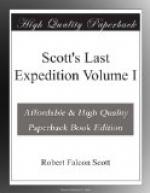Some of the staff were like dead men with sea-sickness. Even so Cherry-Garrard and Wright and Day turned out with the rest of us and alternately worked and were sick.
I have no sea-sickness on these ships myself under any conditions, so I enjoyed it all, and as I have the run of the bridge and can ask as many questions as I choose, I knew all that was going on.
All Friday and Friday night we worked in two parties, two hours on and two hours off; it was heavy work filling and handing up huge buckets of water as fast as they could be given from one to the other from the very bottom of the stokehold to the upper deck, up little metal ladders all the way. One was of course wet through the whole time in a sweater and trousers and sea boots, and every two hours one took these off and hurried in for a rest in a greatcoat, to turn out again in two hours and put in the same cold sopping clothes, and so on until 4 A.M. on Saturday, when we had baled out between four and five tons of water and had so lowered it that it was once more possible to light fires and try the engines and the steam pump again and to clear the valves and the inlet which was once more within reach. The fires had been put out at 11.40 A.M. and were then out for twenty-two hours while we baled. It was a weird’ night’s work with the howling gale and the darkness and the immense seas running over the ship every few minutes and no engines and no sail, and we all in the engine-room, black as ink with the engine-room oil and bilge water, singing chanties as we passed up slopping buckets full of bilge, each man above’ slopping a little over the heads of all below him; wet through to the skin, so much so that some of the party worked altogether naked like Chinese coolies; and the rush of the wave backwards and forwards at the bottom grew hourly less in the dim light of a couple of engine-room oil lamps whose light just made the darkness visible, the ship all the time rolling like a sodden lifeless log, her lee gunwale under water every time.
December 3. We were all at work till 4 A.M. and then were all told off to sleep till 8 A.M. At 9.30 A.M. we were all on to the main hand pump, and, lo and behold! it worked, and we pumped and pumped till 12.30, when the ship was once more only as full of bilge water as she always is and the position was practically solved.
There was one thrilling moment in the midst of the worst hour on Friday when we were realising that the fires must be drawn, and when every pump had failed to act, and when the bulwarks began to go to pieces and the petrol cases were all afloat and going overboard, and the word was suddenly passed in a shout from the hands at work in the waist of the ship trying to save petrol cases that smoke was coming up through the seams in the after hold. As this was full of coal and patent fuel and was next the engine-room, and as it had not been opened for the airing, it required to get rid of gas on account of the flood of water on deck making it impossible to open the hatchways; the possibility of a fire there was patent to everyone and it could not possibly have been dealt with in any way short of opening the hatches and flooding the ship, when she must have floundered. It was therefore a thrilling moment or two until it was discovered that the smoke was really steam, arising from the bilge at the bottom having risen to the heated coal.




